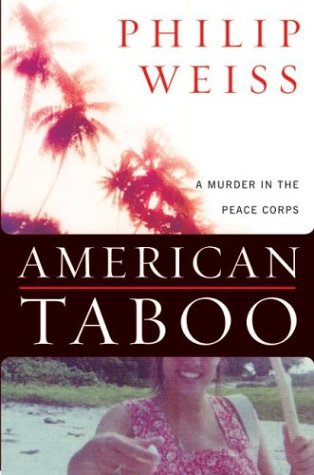June 27, 2004: Headlines: COS - Tonga: COS - Ethiopia: Crime: Murder: Safety and Security of Volunteers: Washington Post: Ethiopia RPCV Richard Lipez reviews American Taboo
Peace Corps Online:
Directory:
Tonga:
Special Report: 'American Taboo: A Murder in the Peace Corps':
June 27, 2004: Headlines: COS - Tonga: COS - Ethiopia: Crime: Murder: Safety and Security of Volunteers: Washington Post: Ethiopia RPCV Richard Lipez reviews American Taboo
American Taboo: A Murder in the Peace Corps
 | Charges possible in 1976 PCV slaying
Congressman Norm Dicks has asked the U.S. attorney in Seattle to consider pursuing charges against Dennis Priven, the man accused of killing Peace Corps Volunteer Deborah Gardner on the South Pacific island of Tonga 28 years ago. Background on this story here and here. |
 | American Taboo
Read the story of Volunteer Deborah Gardner's murder in Tonga in 1976 and how her killer has been free for the past 28 years with the help of the Peace Corps. Read an excerpt from Philip Weiss' book documenting the murder and coverup. Then read an essay by RPCV Bob Shaconis who says that Peace Corps' treatment as a "sacred cow" has exempted it from public scrutiny and that the agency has labored to preserve its shining reputation, sometimes at the expense of the very principles it is supposed to embody. |
Ethiopia RPCV Richard Lipez reviews American Taboo

Ethiopia RPCV Richard Lipez reviews American Taboo
A Killer Among Us
Reviewed by Richard Lipez
Sunday, June 27, 2004; Page BW04
AMERICAN TABOO
A Murder in the Peace Corps
Click here!
By Philip Weiss. HarperCollins. 369 pp. $25.95
This meticulously deconstructed tale of a Peace Corps volunteer murdering another in Tonga and basically getting away with it has to be one of the most exotic true-crime books of recent years, and one of the saddest. Philip Weiss, a journalist who first heard of the case 26 years ago while backpacking in the South Pacific, is still seething over the injustice of a brutal killer going free and the U.S. government's cover-up of the ugly debacle in order to save careers and preserve the Peace Corps's smiley-face sheen.
Weiss names names, confronts the killer in New York City and plainly aches to have his book right some wrongs. But we're dealing here with a man Weiss convincingly portrays as a manipulative "evil" sociopath -- and with a murky legal situation as well. So, little may come of Weiss's efforts beyond some vague "closure" for people close to the victim, plus an exhaustively researched book that is intermittently spellbinding -- as when late in the book Weiss lunches with the killer at a Dean & Deluca in Soho -- but it is a third longer than it needs to be, and is unconvincing whenever it tries to transmute its material into a story of American lost innocence.
Deborah Ann Gardner, 23, of Tacoma, Wash., had been teaching science in the tiny South Pacific kingdom of Tonga for less than a year when, on the evening of Oct. 14, 1976, she was stabbed 22 times with a long knife. Tongan neighbors heard her screams and saw a man one of them recognized drop the badly injured young woman on the doorsill of her small house and ride off on a bicycle. Before Gardner died en route to the hospital, she was asked by Pila Mateialona, a Peace Corps driver, "Who did this to you?" She replied, "Dennis."
Everyone involved, including the eyewitness, knew that meant Dennis Priven, a 26-year-old New York science and math teacher nearing the end of his two-year Peace Corps tour. Unlike Gardner, a popular, smart, open-spirited knockout of a woman, Priven was moody, geeky and one of the cynics in the group. Every Peace Corps group has a few volunteers whose distaste for the culture they've been dropped into sours into open scorn, and Priven was one of them. At the time of the murder, Priven had recently been turned down for a third-year extension, and he had also been rejected romantically by Deb Gardner. She had dated other volunteers, and Priven "thought he should get a turn with her." When she said no, Priven stalked Gardner and killed her.
No one has contested the essentials of this outline, confirmed at the time by forensic evidence. So why, beyond a few months' pre-trial detention, has Priven never been punished for his crime? Because a Tongan jury found him not guilty by reason of insanity, the first such verdict in the country's history. U.S. officials led the Tongan government to believe that if Priven was let go, he would be locked up back home in a humane institution for the criminally insane. These officials knew all along, however, that legally Priven could be committed to a U.S. mental hospital only if he volunteered. Once in Washington, Priven announced he intended to do no such thing, asked for and received his last Peace Corps paycheck, and went home to Brooklyn.
Tapu is the only Tongan word to have made it into the English language, brought back by Capt. Cook in the late 1700s as "taboo." In Tonga, it means "forbidden," but, as Weiss observes, the word also has "an intangible spiritual quality, with the weight of a curse." Peace Corps volunteers in Tonga were bemused when some acts, innocuous to them, were considered tapu. For instance, a brother baring his stomach to his sister was tapu since "the stomach was considered a sexual part, for it slapped during sex."
Tongans were, if anything, far more inclined to find American customs and morality unfathomable in the immediate aftermath of Gardner's murder. The Peace Corps seemed to care more about Priven than his victim, or her friends, or her confused and distraught family back in the United States. Peace Corps volunteers have no diplomatic immunity, and the local authorities wanted to follow Tongan law, which meant putting Priven to trial under their jurisdiction and either imprisoning or hanging him. The Peace Corps, suddenly not so respectful of local customs, just wanted to get Priven out of the hands of these backward Third Worlders. How would it play stateside if these islanders strung up a young American? How would congressional budget makers react?
Twenty-five years later, a Tongan who had been one of Gardner's students told Weiss how sickened he and others had been to see Peace Corps officials, as well as a few morally confused volunteers, carrying meals to Priven in his jail cell and strategizing his defense with a Tongan New Zealander known as the Perry Mason of the Pacific. "I was a baby," the former student said, "and then I was toughened forever."
Some of the officials depicted here are right out of Evelyn Waugh. Especially wondrous is the director of the Tonga Peace Corps program, Mary George, a born-again Christian and former fashion model with a bone-crushing handshake, who got her job through Ford-administration political connections. One day in church she had a vision that Priven was innocent and was being railroaded, and from then on she skirted Tongan and U.S. law at every opportunity, trying to get him sprung.
State Department mediocrities breezed in and out of the picture, assuring the king that friendly relations with Tonga were all-important, so let's just make this sticky business go away. Some Peace Corps officials were conscience-stricken and maneuvered toward a facsimile of justice. But legal ambiguities and a tsunami of image-mongering soon overwhelmed their efforts.
While Weiss lays all this out exactingly and with a nice feel for both Tongan and Peace Corps life, in the end it's unclear why he believed this sorry saga was worth a long book instead of a long magazine article. He is rightly outraged that the Peace Corps, an organization he terms "one of the noble achievements of postwar American society," hypocritically corrupted the justice system of a country whose culture it had pledged to respect and serve. But Weiss never makes the case that the Gardner-Priven horror was anything more than a weird aberration in the Peace Corps and in international legal history. Deb Gardner was the unlucky victim of a man who is a moral nullity, and the most chilling thing about Weiss's story is that it may have no meaning at all. •
Richard Lipez was a Peace Corps volunteer in Ethiopia from 1962-64 and later worked for the agency as a program evaluator.
© 2004 The Washington Post Company

Some postings on Peace Corps Online are provided to the individual members of this group without permission of the copyright owner for the non-profit purposes of criticism, comment, education, scholarship, and research under the "Fair Use" provisions of U.S. Government copyright laws and they may not be distributed further without permission of the copyright owner. Peace Corps Online does not vouch for the accuracy of the content of the postings, which is the sole responsibility of the copyright holder.
Story Source: Washington Post
This story has been posted in the following forums: : Headlines; COS - Tonga; COS - Ethiopia; Crime; Murder; Safety and Security of Volunteers
PCOL12071
63
.



